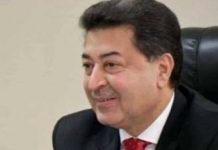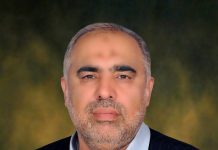QUETTA: Inspector General of Balochistan Police Ahsan Mehboob on Friday said that Indian intelligence agency RAW was funding different militant and armed groups including Taliban, Lashkar-e-Jhangvi and separatists to disrupt peace and stability in the province.
“They want to destabilise economy and affect the efforts being made to execute China Pakistan Economic Corridor (CPEC),” he said. “We had to face several obstacles in implementation of National Action Plan (NAP), as 716 police personnel were martyred and over 500 suffered injuries in different encounters with terrorists and attacks by anti-peace elements during the operations under NAP.”
However, the IG said, now NAP has started bearing fruits as law enforcement agencies have taken control on militants. “Situation is now very different in Turbat, Awaran, Panjgur, Dera Bugti and Kohlu, as no one could enter there or move freely. Militants were attacking law enforcement agencies/civilians and damaging government properties,” he said, adding that NAP first started in these specific districts and transformed them from volatile to completely peaceful areas.
The IG said that after the killing of Baloch leader Nawab Akbar Khan Bugti, the law and order situation started to deteriorate in the province while the Indian intelligence took benefit of the situation and started funding and providing fight-training to militants. “There were some shortcomings and unrealistic aspects in strategies to deal with militancy in past which had been reported soon after the killing of Nawab Bugti,” he said, adding that later, those shortcomings were removed when National Action Plan was formulated.
The police chief said, “Although we had achieved some positives from NAP, but the government would have to execute development projects in affected areas to accelerate the pace of its implementation. We will have to focus on efforts to deprive militants from hiring/taking support of some locals of any area for which the government would have to provide employment to jobless youth and provide all basic civic amenities and utility services in these areas.”
He said he rejects the false and baseless propaganda against NAP, saying that there was no failure in its implementation as positive results have been obtained. However, he added, the government departments would have to immediately provide health, education and other necessary facilities to local people in order to remove sense of deprivation.
He said that backbone of separatists and religious fanatics had been broken through NAP and they were forced to flee the areas where they were waging militancy. “It is evidence from successful results of NAP that now there were no incidents of target killings in Hazara and no abduction of Hindu community men,” Mehboob said.
The IG mentioned that strength of Balochistan Police was 37,000, while 70 platoons of police were deployed for security of important government installations in the provincial capital. Presently, 8,000 police personnel have been performing their duties in Quetta and under NAP, several new posts were created in Balochistan police and recruitment was made to ensure peace and security in the province, he added.
“We formed Counter Terrorism Department (CTD) of Police, which needed 1,200 or more personnel, besides we need more personnel in provincial police,” he said, adding that CTD was formed following the NAP, which in collaboration with Anti-Terrorist Force (ATF), carried out several search operations against terrorists and successfully rooted out their networks.
The networks of militant organisations including religious and separatists have been destroyed through successful actions taken by the CTD and ATF, he said, adding that all these operations were carried out following the intelligence information. In reply to a question, the provincial police chief said that non-custom paid illegal (Kabli) vehicles were also used in acts of terror and stern action was taken against the business of Kabli vehicles in the province. He informed that to effectively implement NAP, around Rs 600 million were spent to purchase new equipment, including bulletproof vehicles for Balochistan police, adding that Pakistan Army was requested to provide professional training to police personnel with a view make the role of Balochistan police in NAP more effective.
“I am happy that the widows of martyred police officers and sons of three martyred police officers were among those police officers that received professional anti-terrorism training,” he said, adding that over 1,400 police personnel have completed their anti-terrorists professional training by army instructors so far.
He said that it was true that some senior police officials, who were transferred from Islamabad and other provinces to Balochistan, avoided joining their duties in Balochistan. Such police officials would have to join their duties in Balochistan to serve the nation and the country, he added.
Mehmood said that cases of terrorists found involved in target killings of police officers/personnel were heard and decided by the military and anti-terrorism courts. “Eight to 10 terrorists involved in target killings of police personnel were sentenced by the courts,” he added.
He said that a comprehensive plan had been devised for security of CPEC from Zhob to Gwadar, adding that about Rs 4 billion were required for the implementation of the security plan. The provincial police chief assured that Balochistan would fulfill its responsibilities if it were provided security in this regard.











